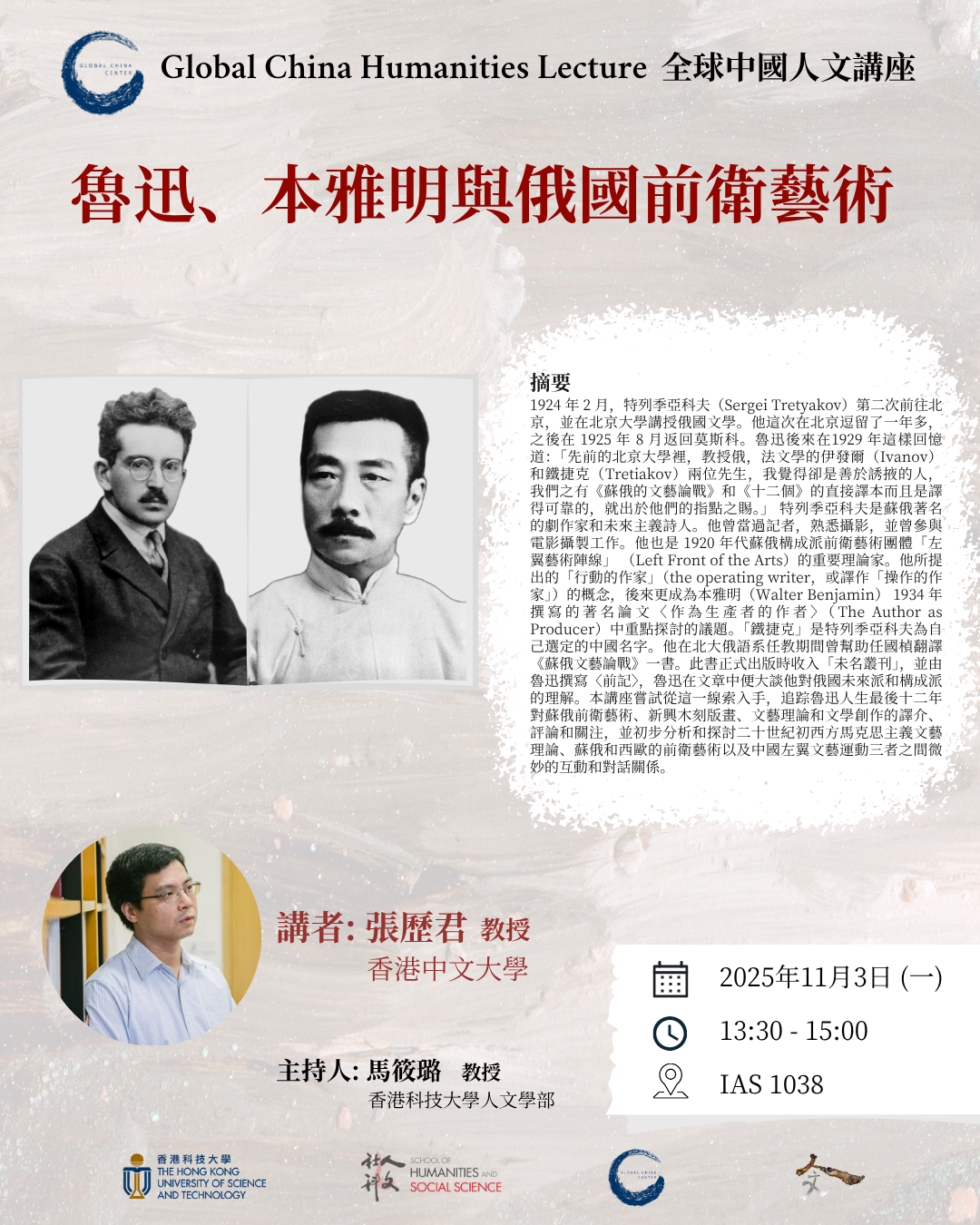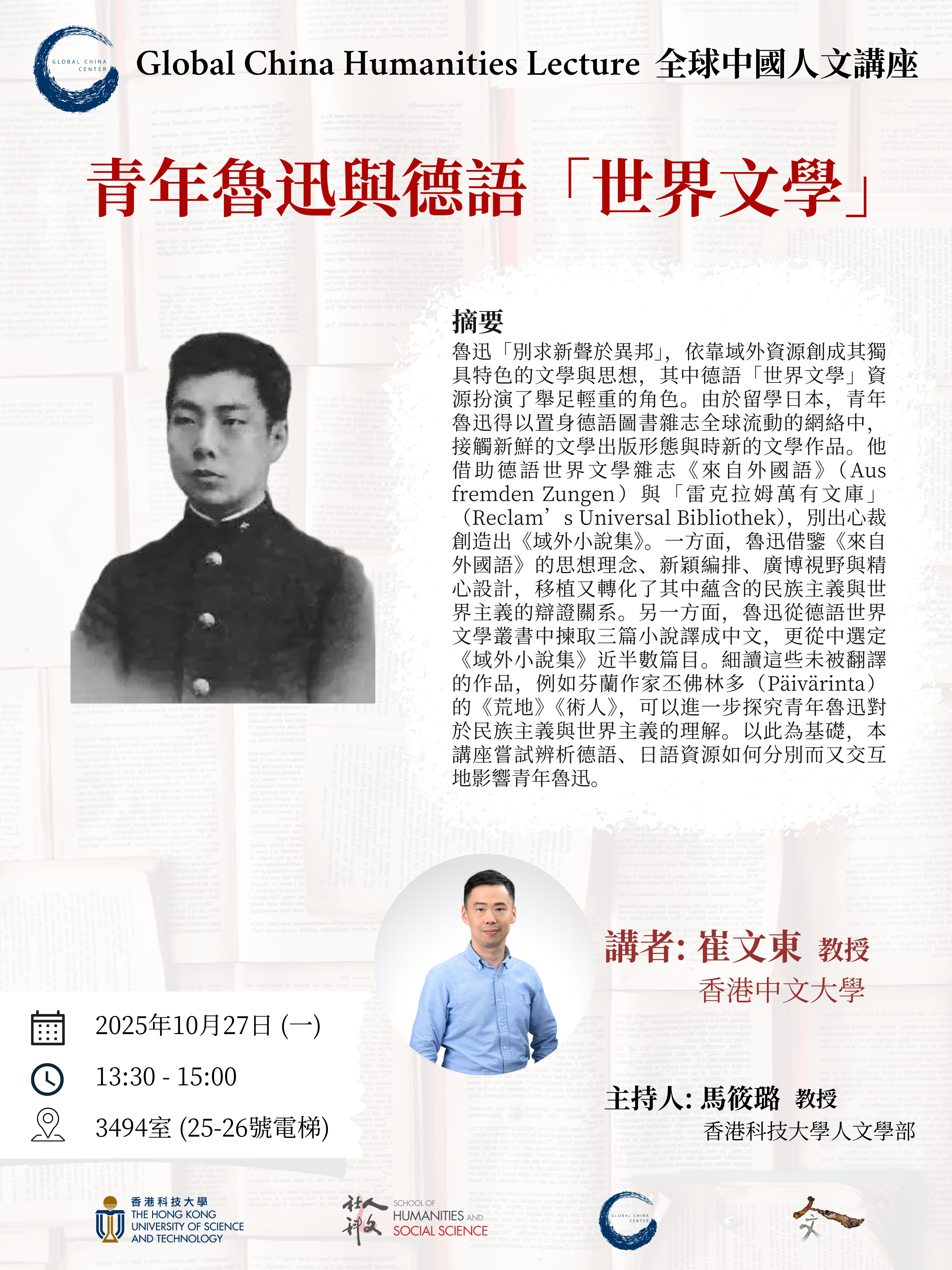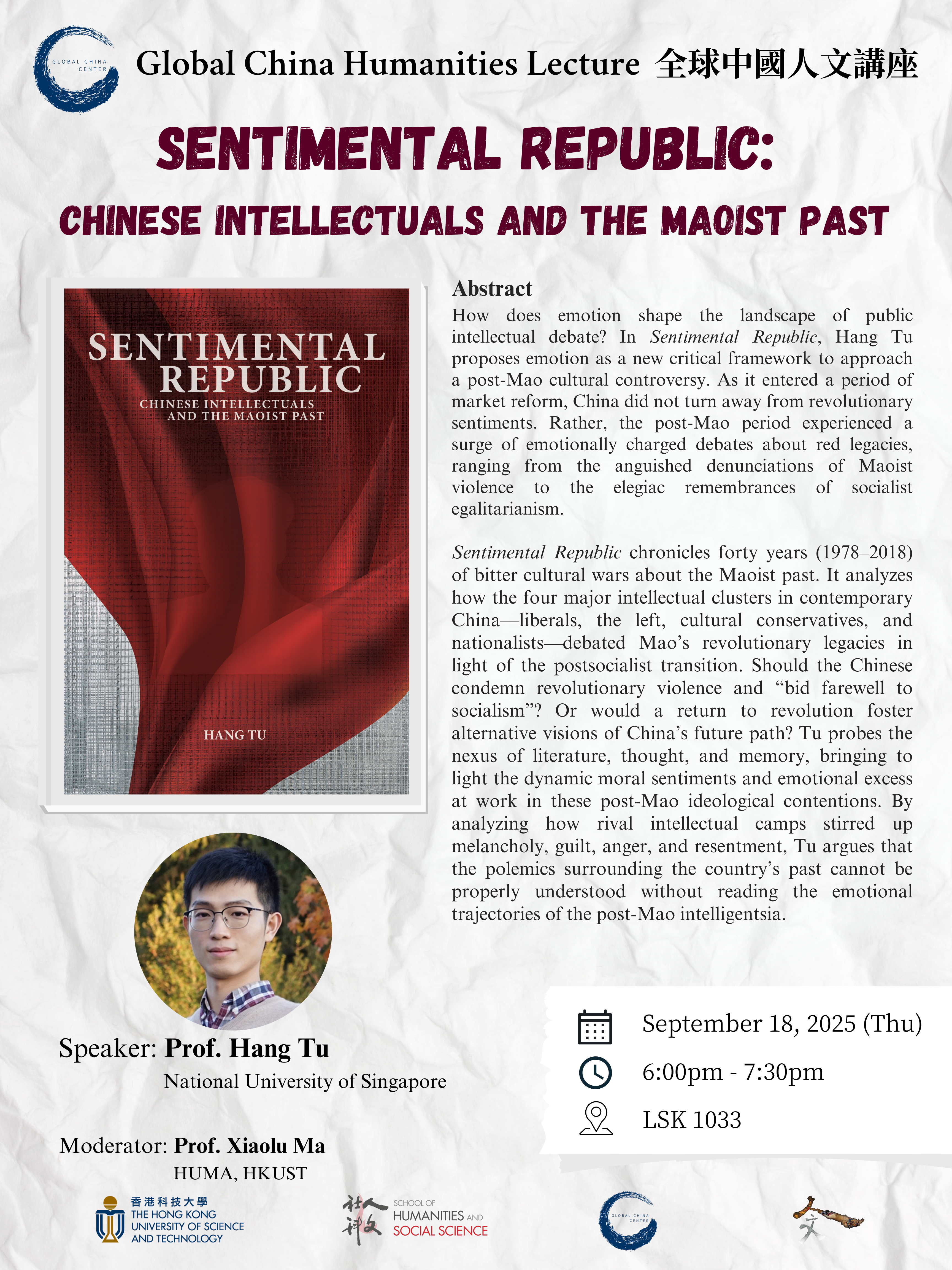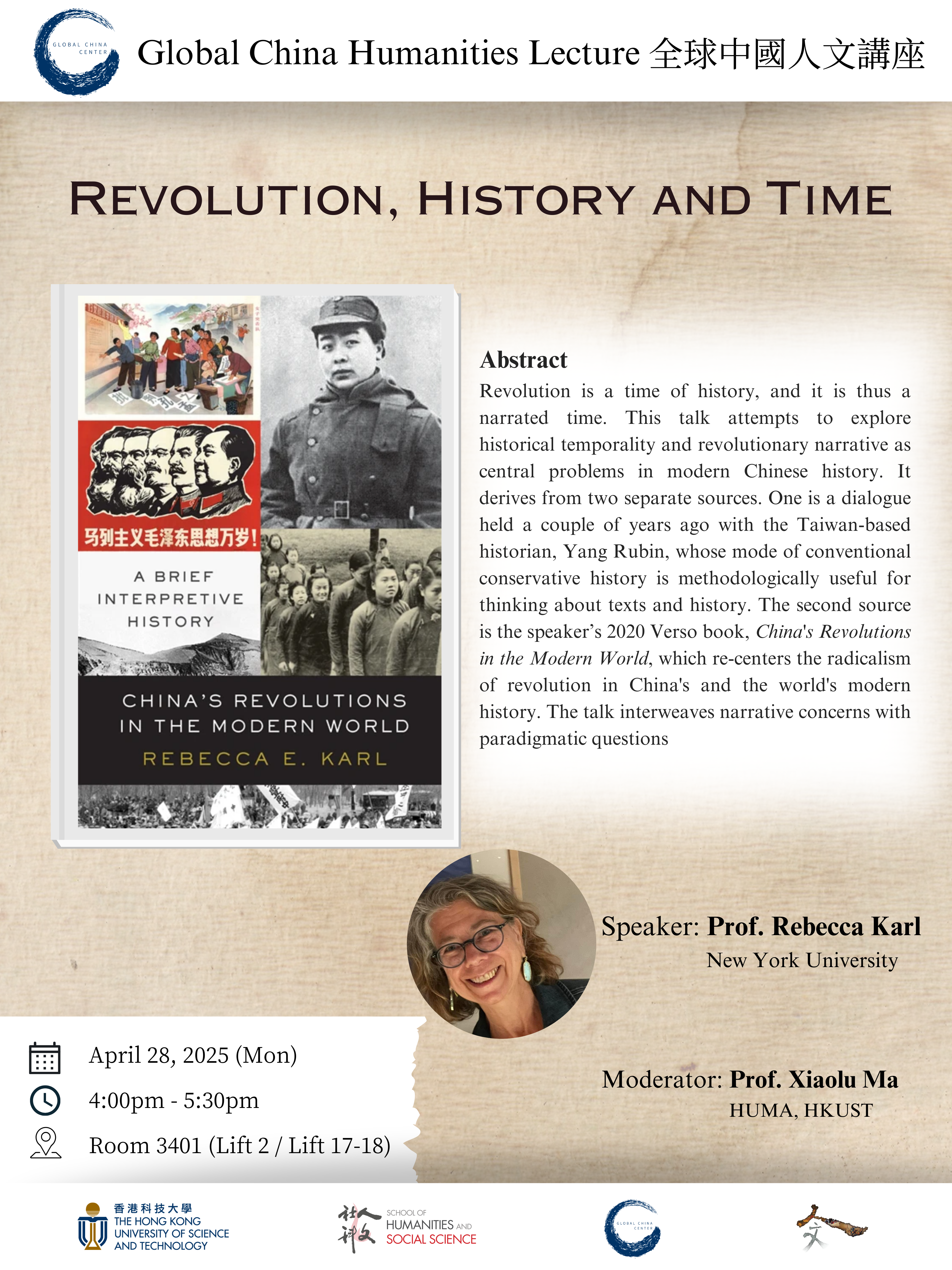A poster for a Chinese high-speed train at the construction site for a bridge over the Mekong River in Laos
Upcoming Events
Past Events
From Monkey King: Hero’s Return to Ne Zha 2: What Makes a Good China Story?
Room 3401 (Lift 2 / Lift 17-18), HKUST
Ne Zha 2 (Yu Yang, 2025), a Chinese animation based on a Chinese legend broke global box-office records for animated films. Patriotic Chinese netizens cheered for its success, though the film gained little traction beyond the Chinese market. Numerous reports and commentaries published by the state run media in China nonetheless highlighted the film’s success in “telling the good China story.”A decade ago, another Chinese animation, Monkey King: Hero’s Return (Tian Xiaopeng, 2015) made a splashy critical and commercial debut, though its total box-office of US$153 million pales in comparison to Ne Zha 2’s US$2.2 billion. Yet Monkey King too was made into a national hero for transforming Chinese animation film. From Monkey King to Ne Zha 2, the nationalist fervour to propagate Chinese culture abroad only grew stronger, endowing Chinese animation with the mission of carrying the China torch. The effort begs the question of the criteria upon which “a good China story” can be measured and the efficacy of image building by mining Chinese mythology and Legends. My talk examines the gap between the film’s runaway domestic success and its lukewarm international reception to discuss the basics of quality audiovisual storytelling and the weight, if not burden, of storytelling as singing the Gospel of Chinese culture. READ MORE...
魯迅、本雅明與俄國前衛藝術
IAS 1038, Lo Ka Chung Building, Lee Shau Kee Campus, HKUST
1924 年 2 月,特列季亞科夫(Sergei Tretyakov)第二次前往北京,並在北京大學講授俄國文學。他這次在北京逗留了一年多,之後在 1925 年 8 月返回莫斯科。魯迅後來在1929 年這樣回憶道:「先前的北京大學裡,教授俄,法文學的伊發爾(Ivanov)和鐵捷克(Tretiakov)兩位先生,我覺得卻是善於誘掖的人,我們之有《蘇俄的文藝論戰》和《十二個》的直接譯本而且是譯得可靠的,就出於他們的指點之賜。」 特列季亞科夫是蘇俄著名的劇作家和未來主義詩人。他曾當過記者,熟悉攝影,並曾參與電影攝製工作。他也是 1920 年代蘇俄構成派前衛藝術團體「左翼藝術陣線」 (Left Front of the Arts)的重要理論家。他所提出的「行動的作家」(the operating writer,或譯作「操作的作家」)的概念,後來更成為本雅明(Walter Benjamin) 1934 年撰寫的著名論文〈作為生產者的作者〉(The Author as Producer)中重點探討的議題。「鐵捷克」是特列季亞科夫為自己選定的中國名字。他在北大俄語系任教期間曾幫助任國楨翻譯《蘇俄文藝論戰》一書。此書正式出版時收入「未名叢刊」,並由魯迅撰寫〈前記〉,魯迅在文章中便大談他對俄國未來派和構成派的理解。本講座嘗試從這一線索入手,追踪魯迅人生最後十二年對蘇俄前衛藝術、新興木刻版畫、文藝理論和文學創作的譯介、評論和關注,並初步分析和探討二十世紀初西方馬克思主義文藝理論、蘇俄和西歐的前衛藝術以及中國左翼文藝運動三者之間微妙的互動和對話關係。 READ MORE...
青年魯迅與德語「世界文學」
Room 3494 (Lift 25-26), HKUST
魯迅「別求新聲於異邦」,依靠域外資源創成其獨具特色的文學與思想,其中德語「世界文學」資源扮演了舉足輕重的角色。由於留學日本,青年魯迅得以置身德語圖書雜志全球流動的網絡中,接觸新鮮的文學出版形態與時新的文學作品。他借助德語世界文學雜志《來自外國語》(Aus fremden Zungen)與「雷克拉姆萬有文庫」(Reclam’s Universal Bibliothek),別出心裁創造出《域外小說集》。一方面,魯迅借鑒《來自外國語》的思想理念、新穎編排、廣博視野與精心設計,移植又轉化了其中蘊含的民族主義與世界主義的辯證關系。另一方面,魯迅從德語世界文學叢書中揀取三篇小說譯成中文,更從中選定《域外小說集》近半數篇目。細讀這些未被翻譯的作品,例如芬蘭作家丕佛林多(Päivärinta)的《荒地》《術人》,可以進一步探究青年魯迅對於民族主義與世界主義的理解。以此為基礎,本講座嘗試辨析德語、日語資源如何分別而又交互地影響青年魯迅。 READ MORE...
世界的白蛇—越界與重生之力
IAS 1038, Lo Ka Chung Building, Lee Shau Kee Campus, HKUST
充滿活力的英語白蛇譜系從十九至二十世紀之交一直延伸到二十一世紀,成為本研究的關鍵個案,顯示出白蛇現象的當代性和跨越性及其對全球文化生產日益增長的影響力。本書原稿以英文寫就,探討白蛇傳說在亞洲及全球範圍內多姿多彩的旅行。作者揀取埋藏於故紙堆中的相關歷史文本,同時更面對白蛇傳說的諸多新變種,在歷史與當下的對比和參照中,追蹤白蛇跨界旅行的意義和價值嬗變,深度解析了中、英、日、韓語種的白蛇文本,發掘了白蛇故事對複合身份與多元性向、越界之愛、反抗權威、非凡之人與物等各種激進思想的包容性。作者强調,文化即是挪用;文化產品本身就是在不斷斡旋、不斷轉型中產生出來的。文化的旅行與變形能力正是促使其生生不息的原因。正如白蛇一般,任何文化都需要不斷蛻皮重生。 READ MORE...
Sentimental Republic: Chinese Intellectuals and the Maoist Past
LSK 1033, HKUST
How does emotion shape the landscape of public intellectual debate? In Sentimental Republic, Hang Tu proposes emotion as a new critical framework to approach a post-Mao cultural controversy. As it entered a period of market reform, China did not turn away from revolutionary sentiments. Rather, the post-Mao period experienced a surge of emotionally charged debates about red legacies, ranging from the anguished denunciations of Maoist violence to the elegiac remembrances of socialist egalitarianism. Sentimental Republic chronicles forty years (1978–2018) of bitter cultural wars about the Maoist past. It analyzes how the four major intellectual clusters in contemporary China—liberals, the left, cultural conservatives, and nationalists—debated Mao’s revolutionary legacies in light of the postsocialist transition. Should the Chinese condemn revolutionary violence and “bid farewell to socialism”? Or would a return to revolution foster alternative visions of China’s future path? Tu probes the nexus of literature, thought, and memory, bringing to light the dynamic moral sentiments and emotional excess at work in these post-Mao ideological contentions. By analyzing how rival intellectual camps stirred up melancholy, guilt, anger, and resentment, Tu argues that the polemics surrounding the country’s past cannot be properly understood without reading the emotional trajectories of the post-Mao intelligentsia. READ MORE...
Seditious Voices: Revolution and Information in the Korean War Campaign, 1950-1953
Room 4502 (Lift 25-26), HKUST
To date, historians in China and the West were drawn to studying the Korean War largely because it is the first foreign war the communist revolutionary state fought under the mantle of internationalism and the first hot war during the Cold War that inaugurated the US-China confrontation for more than two decades. They have shown convincingly that China’s entrance into the Korean conflict signified a critical turning point in China’s foreign policy and domestic politics. Yet, few seem to have thought to ask how the government sold such a complex war to the public and how the public reacted to the top-down effort intended to win their hearts and minds, a mere eight months after the Communists won the national victory and seventeen months after Beijing came under Communist rule. This talk, built upon Ma's forthcoming book, intends to move beyond the sort of “history of the headquarters” by exploring connections between the official and grassroots levels, and between political rhetoric and quotidian effects, to uncover the social meaning of the war. READ MORE...
Research and Writing at the Intersection of Diplomatic and Legal History
Room 3401 (Lift 2 / Lift 17-18), HKUST
Historians construct narratives from fragmented and often contradictory sources — but in an era of digital archives, online databases, and growing restriction on archival access, the process of research and writing history can look and feel quite different from just a decade or two ago. In this session, Professor Jenny Huangfu Day reflects on the intellectual and practical challenges and opportunities of archival research, especially at the intersection of diplomatic and legal history. Drawing from case studies in her forthcoming book, she shares how research questions take shape in response to conflicting sources, and how archival work, particularly in diplomatic and legal contexts, demands both interpretive rigor and interdisciplinary methodology. READ MORE...
Patriarchy Falling Short: Gender Failure and Suicide in Qing Law
Room 4504 (Lift 25-26), HKUST
This talk, drawn from Wang's ongoing research, focuses on several examples of male suicide from Qing period legal archives across the 18th & 19th centuries. Unlike early modern European societies, suicide was not inherently sinful or criminal in China, creating a unique suicidal "necropolitics." Furthermore, in this era, there was unprecedentedly widespread positive state recognition of female suicide for “chastity” as analogy to men's heroic self-sacrifice for the state, especially on the battlefield. Arguably, chastity became the main, if not the only, measure for proper femininity. What did this context mean for boys and men who attempted and completed suicide not linked to war? Wang will put forward an interpretation of these deaths as the result of “gender failure”: when men fall short of externally enforced & personally internalized gender norms, one way “out” was to end their lives. READ MORE...
Revolution, History and Time
Revolution is a time of history, and it is thus a narrated time. This talk attempts to explore historical temporality and revolutionary narrative as central problems in modern Chinese history. It derives from two separate sources. One is a dialogue held a couple of years ago with the Taiwan-based historian, Yang Rubin, whose mode of conventional conservative history is methodologically useful for thinking about texts and history. The second source is the speaker's 2020 Verso book, China's Revolutions in the Modern World, which re-centers the radicalism of revolution in China's and the world's modern history. The talk interweaves narrative concerns with paradigmatic questions. READ MORE...
The Institutionalized Hypocrisy of Qing Government
Kaisa Group Lecture Theater (IAS LT), Lo Ka Chung Building, Lee Shau Kee Campus, HKUST
Qing statecraft was characterized by a kind of institutionalized hypocrisy. Many aspects of Qing governance have been condemned – both during the dynasty and since – as irrational, aberrant, or corrupt. But these very aspects were key to how that government actually worked. The land tax and other official revenue sources were insufficient to finance operations; nor did nominal salaries cover more than a fraction of officials’ real incomes and expenses. For this reason, Qing government at all levels depended on informal sources of revenue, as well as informal personnel employed in excess of centrally mandated quotas, even though most of this technically constituted “corruption.” Similarly, much of the judicial system was outsourced to private parties who operated in a gray zone to advise both litigants and magistrates and even to publish the law; and given the limited reach of the state, social order depended in practice on the extra-judicial community regulation of a wide range of transactions and relationships, many of which were nominally prohibited. Emperors and officials alike employed a pious, self-serving discourse to condemn what actually constituted routine features of the system upon which they all depended, while corruption laws were enforced only occasionally, when an emperor decided to assert himself arbitrarily in order to cow his subordinates. Far from dysfunctional, however, the Qing government worked quite well until the late nineteenth century, when it finally faced unprecedented problems that it could not solve. READ MORE...









